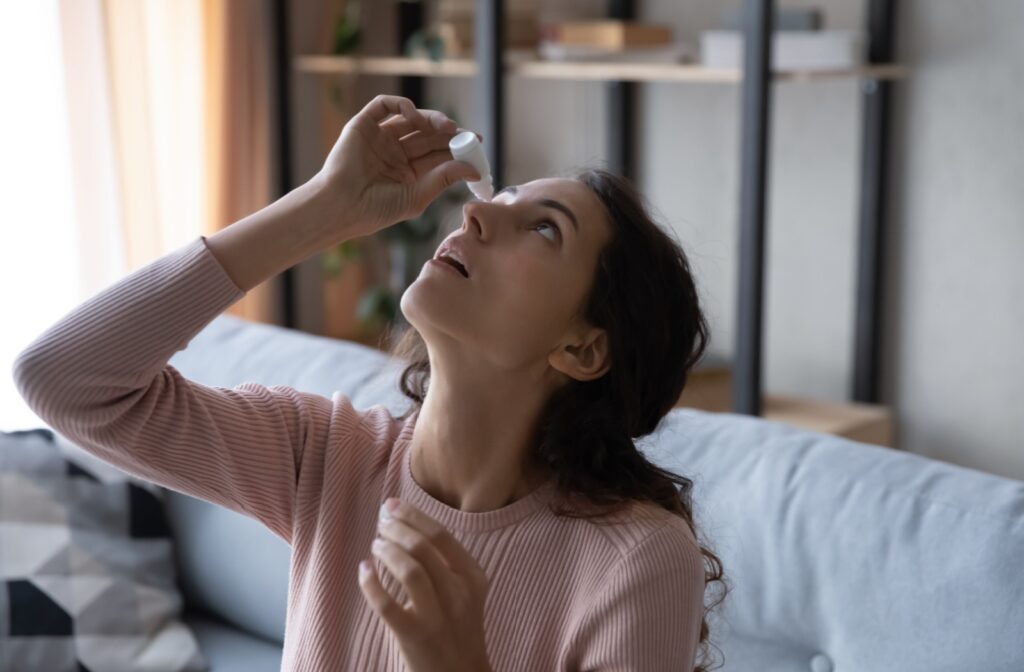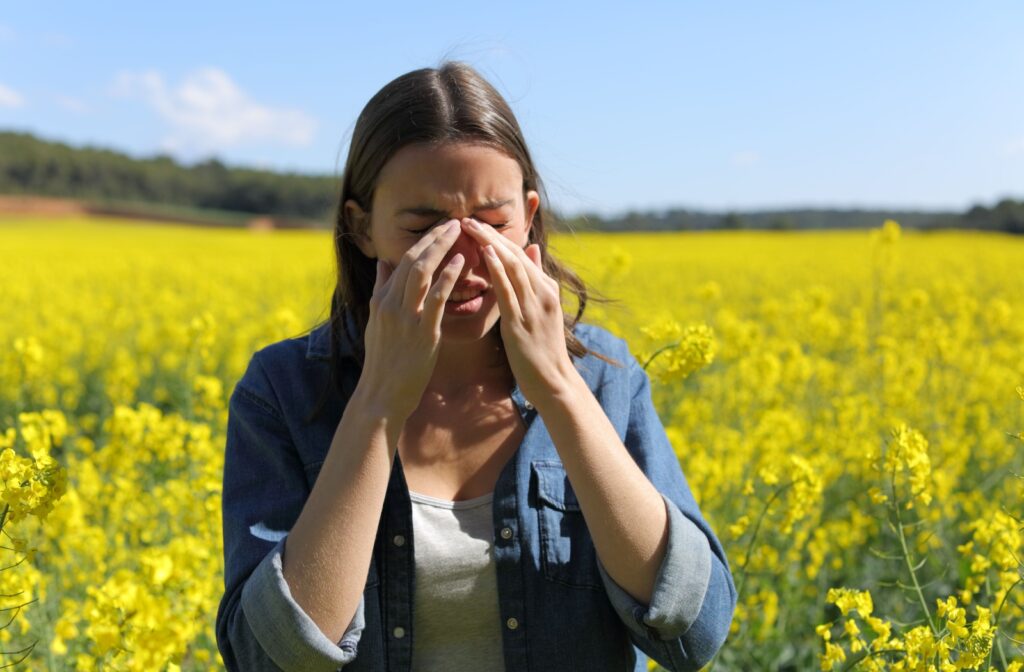Do your eyes feel itchy, gritty, or constantly irritated? If so, you’re not alone. Many people experience eye discomfort every year, and two common culprits are dry eyes and allergies. However, telling these two conditions apart can be tricky, as they often share overlapping symptoms.
Fortunately, by breaking down the cause of your symptoms, you can often distinguish these two issues. Allergies are typically caused by an external irritant, while dry eyes are caused by an issue with tear production or quality.
The Effects of Eye Allergies
Eye allergies, or allergic conjunctivitis, occur when your immune system overreacts to allergens like pollen, pet dander, mold, or dust mites. These allergens trigger the release of histamines, causing inflammation and discomfort in and around your eyes.
Common Symptoms of Eye Allergies
- Itching: Persistent eye rubbing is common, as the itching can feel relentless.
- Redness: Blood vessels in the eyes swell, leading to noticeable redness.
- Tearing: Watery eyes are a telltale sign of allergies.
- Swelling: Puffiness, especially around the eyelids, is frequent with allergic reactions.
- Sneezing or Nasal Congestion: Eye allergies often don’t travel alone and may accompany other allergic symptoms, such as a stuffy nose or sneezing.
Eye allergies are typically seasonal, often spiking during spring or fall due to pollen, or year-round if triggered by indoor allergens.
When to Suspect Eye Allergies
If your symptoms happen at specific times of the year (like pollen season) or in particular environments (like houses with pets), allergies are likely the cause.
What Are Dry Eyes?
Dry eye syndrome, on the other hand, is a condition in which the eyes don’t produce enough or good enough quality tears to keep their surface lubricated and healthy. Dry eye is often caused by environmental factors, prolonged screen use, aging, or underlying medical conditions.
Common Symptoms of Dry Eyes
- Burning Sensation: A consistent feeling of abrasiveness or burning in the eyes.
- Dryness: The sensation of having sand in your eyes.
- Blurred Vision: Vision may become temporarily blurry, especially after long periods of focus.
- Light Sensitivity: Dry eyes can cause discomfort when exposed to bright lights.
- Discomfort After Screen Use: Prolonged staring at digital devices can exacerbate symptoms.
Dry eyes tend to be more chronic and unpredictable compared to the seasonal or situational nature of eye allergies.
Who Is at Risk?
Dry eyes are more common in people over 50, people who wear contact lenses, and those exposed to environmental triggers like wind or smoke. Hormonal changes, certain medications, and underlying health conditions like autoimmune diseases can also contribute to dry eyes.
Allergies vs. Dry Eyes: Spotting the Differences
While there’s a lot of symptom overlap, a few key distinctions can help you differentiate between allergies and dry eyes.
| Symptom | Eye Allergies | Dry Eyes |
| Itching | Very Common | Rare |
| Redness | Common | Common |
| Tearing | Frequent (watery discharge) | Rare or absent |
| Burning Sensation | Rare | Common |
| Seasonal Pattern | Often seasonal (spring/fall) | Typically year-round |
| Nasal or Allergy Symptoms | Frequent (e.g., sneezing, runny nose) | Rare |
| Reactions to Screens/AC | Unlikely | Very Likely |
By comparing when and how your symptoms occur, you can often identify which condition you’re dealing with.
Treating Allergies & Dry Eye
Once you’ve identified the likely cause of your symptoms, the next step is to explore treatment options that meet your needs. The right approach can effectively manage allergies and dry eyes.
Effective Treatments for Allergies
- Over-the-Counter Eye Drops: Antihistamine eye drops can quickly relieve allergic symptoms by blocking histamines and reducing inflammation.
- Avoid Triggers: Identify and minimize contact with allergens as much as possible. Use air purifiers, close windows on high-pollen days, and frequently clean bedding.
- Prescription Medications: If over-the-counter treatments aren’t enough, your doctor may prescribe more potent antihistamines or steroid eye drops for severe cases.
- Cold Compress: Applying a cold, damp cloth to your eyelids can reduce redness and swelling caused by allergies, providing soothing relief.
Practical Tips for Allergies
- Wear sunglasses outdoors to minimize exposure to airborne allergens.
- Avoid rubbing your eyes, as this can aggravate symptoms.
- Shower at night to rinse pollen off of your hair and skin before sleeping.
Effective Treatments for Dry Eyes
- Artificial Tears: Over-the-counter lubricating eye drops can provide much-needed hydration to dry eyes. If you use them frequently, look for preservative-free formulas.
- Lifestyle Adjustments: Take regular breaks from screen time to rest your eyes, especially during long work sessions. Follow the 20-20-20 rule (look 20 feet away for 20 seconds every 20 minutes).
- Humidifier Use: Dry air, especially from air conditioning or heating systems, can exacerbate dry eye symptoms. A humidifier can help maintain eye moisture.
- Prescribed Medications: Your doctor may recommend prescription eye drops like cyclosporine (Restasis) or lifitegrast (Xiidra for chronic or severe cases).
Practical Tips for Dry Eyes
- Avoid prolonged exposure to windy or dry environments without eye protection.
- Blink more often during long screen sessions to maintain eye moisture.
- Drink plenty of water throughout the day to stay hydrated.

When to See an Eye Doctor
If you’ve tried at-home treatments and your symptoms persist or worsen, it’s time to consult a professional. Whether it’s allergies or dry eyes, your eye care provider can perform tests to identify the root cause and recommend advanced treatments tailored to your condition.
Take the Next Step Toward Clearer Vision
Treating eye discomfort shouldn’t feel like guesswork. Understanding the differences between dry eyes and allergies is the first step to finding relief. If you’re unsure what’s causing your symptoms or your remedies aren’t working, consider contacting a trusted eye care professional.
At Pinnacle Eyecare, we’re dedicated to offering a new standard of quality eye care, emphasizing customer service and enhanced patient experience. From young children to seniors, we love building strong, lasting relationships with our patients. Contact us today to find relief for your red, itchy eyes.






